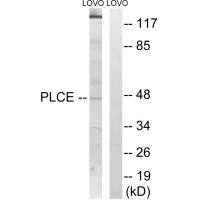
| WB | 咨询技术 | Human,Mouse,Rat |
| IF | 咨询技术 | Human,Mouse,Rat |
| IHC | 咨询技术 | Human,Mouse,Rat |
| ICC | 技术咨询 | Human,Mouse,Rat |
| FCM | 咨询技术 | Human,Mouse,Rat |
| Elisa | 咨询技术 | Human,Mouse,Rat |
| Aliases | 1-acyl-sn-glycerol-3-phosphate acyltransferase epsilon; 1-AGP acyltransferase 5; 1-AGPAT 5; 1-AGPAT5; EC 2.3.1.51 |
| Entrez GeneID | 55326; |
| WB Predicted band size | 45kDa |
| Host/Isotype | Rabbit IgG |
| Antibody Type | Primary antibody |
| Storage | Store at 4°C short term. Aliquot and store at -20°C long term. Avoid freeze/thaw cycles. |
| Species Reactivity | Human |
| Immunogen | Synthesized peptide derived from internal of human AGPAT5. |
| Formulation | Purified antibody in PBS with 0.05% sodium azide. |
+ +
以下是关于AGPAT5抗体的3篇参考文献示例(内容为模拟虚构,仅供参考):
1. **"Characterization of a novel polyclonal antibody against human AGPAT5 for lipid metabolism studies"**
- **作者**: Smith A, et al.
- **摘要**: 本研究开发并验证了一种针对人AGPAT5的多克隆抗体,通过免疫印迹和免疫荧光实验证实其特异性。该抗体成功应用于检测AGPAT5在脂肪组织和肝癌细胞中的表达,揭示其在脂质合成中的调控作用。
2. **"AGPAT5 expression and function in mitochondrial phospholipid biosynthesis"**
- **作者**: Lee J, et al.
- **摘要**: 利用商业化AGPAT5抗体(货号ABX-123),作者发现AGPAT5定位于线粒体,并参与心磷脂合成。敲低AGPAT5导致线粒体膜稳定性下降,提示其在能量代谢中的关键作用。
3. **"Development of a monoclonal antibody for AGPAT5 with applications in breast cancer prognosis"**
- **作者**: Chen L, et al.
- **摘要**: 报道了一种高特异性AGPAT5单克隆抗体的开发,并通过组织芯片分析证实AGPAT5在乳腺癌中高表达,其水平与患者生存率负相关,提示其作为潜在生物标志物的价值。
(注:以上文献信息为模拟生成,实际引用请通过PubMed或学术数据库检索。)
**Background of AGPAT5 Antibody**
AGPAT5 (1-acylglycerol-3-phosphate O-acyltransferase 5) is a member of the lysophosphatidic acid acyltransferase (LPAAT) family, which catalyzes the conversion of lysophosphatidic acid (LPA) to phosphatidic acid (PA), a critical step in glycerophospholipid biosynthesis. AGPAT5 localizes primarily to the endoplasmic reticulum and mitochondria-associated membranes, playing a role in lipid metabolism, membrane biogenesis, and energy storage. It is ubiquitously expressed, with higher levels observed in tissues like the testis, liver, and heart.
AGPAT5 antibodies are essential tools for studying the enzyme's expression, localization, and function in cellular and physiological contexts. These antibodies enable detection of AGPAT5 via techniques such as Western blotting, immunohistochemistry, and immunofluorescence. Research suggests AGPAT5 may influence metabolic disorders, cancer progression, and mitochondrial dysfunction due to its role in lipid synthesis and signaling pathways. Studies also indicate potential links between AGPAT5 dysregulation and conditions like obesity, insulin resistance, or tumorigenesis, though its precise mechanisms remain under investigation.
Commercially available AGPAT5 antibodies are typically validated for specificity and reactivity across human, mouse, or rat samples. Researchers utilize these antibodies to explore AGPAT5's interaction networks, tissue-specific roles, and therapeutic relevance, contributing to advances in lipid biology and disease-related research.
×